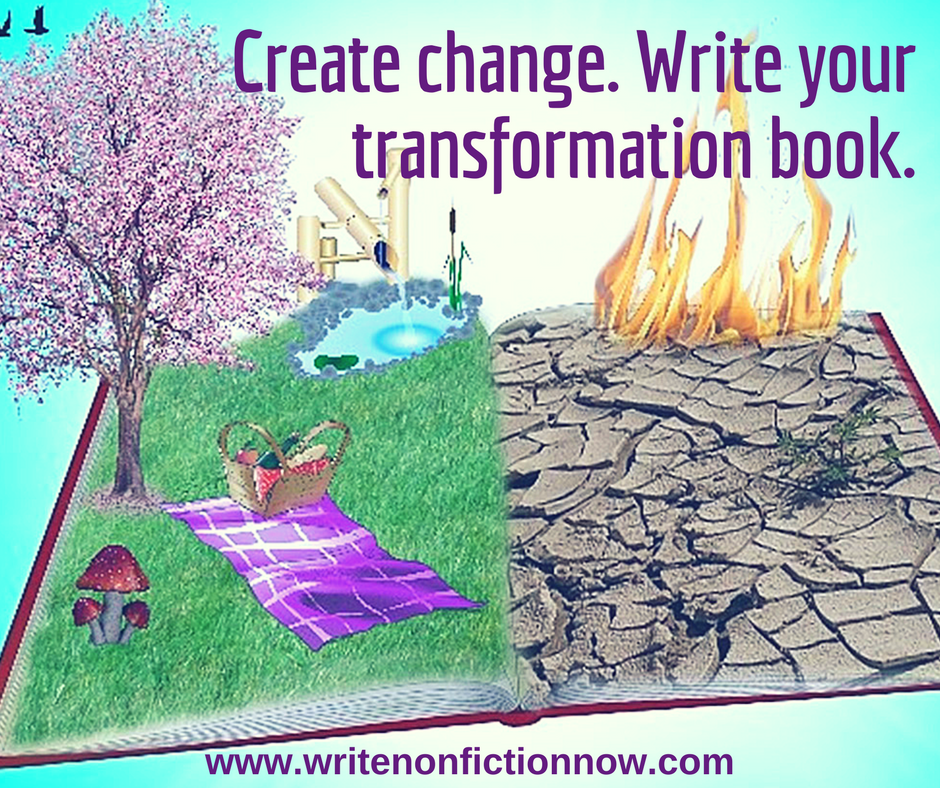 You want to write a nonfiction book that inspires lasting change—to become a transformational book author. But you wonder, “Have I got what it takes to transform readers’ lives?” And you believe you aren’t an expert or leader and don’t know enough or have the credentials to tell anyone how to do anything…let alone change.
You want to write a nonfiction book that inspires lasting change—to become a transformational book author. But you wonder, “Have I got what it takes to transform readers’ lives?” And you believe you aren’t an expert or leader and don’t know enough or have the credentials to tell anyone how to do anything…let alone change.
It’s time you changed your mindset.
In fact, you’ve got what it takes to transform readers’ lives.
How do I know?
If you have the idea for a nonfiction book that could inspire or motivate someone to change, you know enough to write the book. If you didn’t, you wouldn’t possess the idea.
This month, I want to challenge you to begin thinking of yourself differently—as an expert and a change agent. I want you to step into the role of “author of change.” When you do, you will gain the mindset necessary to write a transformational book that will help you author the change you want to see in the world.
March Nonfiction Writer’s Challenge: Become a Transformational Book Author
To transform yourself into an author of change, you must realize four key things about yourself.
1. You are an expert.
If you have more information, knowledge, experience or skill in a particular area than someone else, you are an expert. And if you have an answer to a question or solution to a problem that others don’t have, you are an expert. Additionally, you are an expert on your life—every aspect of it. If your experience can help others, you are an expert. You have expertise.
To author change, you need to use your expertise. The only way to inspire others to change is to lead them toward it confidently.
2. You are a leader.
You might feel the call to start a movement. Or you have a cause to promote. Maybe you want to help heal those suffering from Lyme Disease or stop teen suicide, for example.
How will you achieve this goal?
Lead the way. Become a leader.
You may already be a leader. Look around… Do people follow you? Are you a good role model? Do others listen to you? If so, you are a leader.
If not, it’s time to step into that role. Lead your readers to the transformation they desire.
3. You are a change agent.
If you want to motivate others to change, step into the role of change agent. That doesn’t mean you have to become an activist, but you have to take action toward being and inspiring the change you want to create.
Being a change agent could mean starting a movement or cause. It could mean writing books, articles, or blog posts that motivate change. Or you might become a speaker or podcaster or gather people around you on an internet site or even at a regular in-person meeting.
In some way, however, you have to make change happen.
Do you already do that? Do you naturally gather people around you? Or do you need to make a plan that will help you author change?
4. You are an author of change.
If you can write, you can write a transformational book and turn yourself into an author change. You can compose articles, books, and blog posts that motivate others to take up your cause, become part of your movement, or change in the desired manner.
Your words have impact. So use them to author change. Write and publish your message…and share it with everyone everywhere.
However, it takes more than words.
To make a positive and meaningful impact in the world with your words, embrace your status as an expert, leader, change agent, and author.
Let me know the progress you make with this challenge. Leave a comment below. Also, if you need help with any of this challenge to become an author of change, register for my next Author of Change Transformational Coaching Program, which begins March 27. This one-of-a-kind three-month-long program is your chance to learn how to author change in your life, author change in the world, and author a transformational book. Find out more and register at the early-bird price (save $100), here.
Photo courtesy of mary1826 / Pixabay.com
MARLYS GALLAGHER says
I am writing a transformational memoir for the very purpose of changing lives. I am a licensed therapist and the memoir is about my own traumas and transformation. I have a question which I cannot seem to get answered. How much “tell” can I use in the context of explaining how I used a therapeutic technique for my own good?
Nina Amir says
Do you mean, how much can you share about your own experience? Depends on the type of book. But examples and stories always strengthen a nonfiction book, Marlys. If you have more questions, comment here or shoot me an email.
Tessa says
Thank you for the encouragement (tears).
Nina Amir says
You are welcome!(smiles)